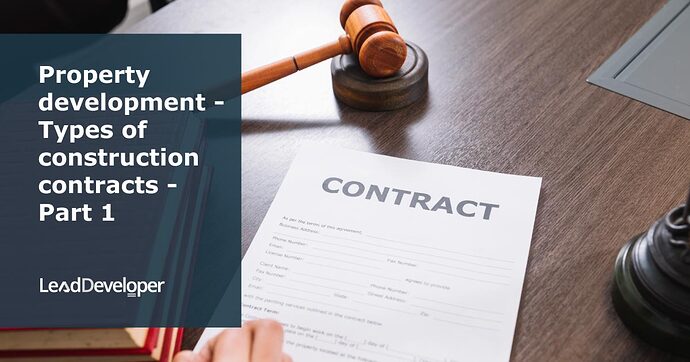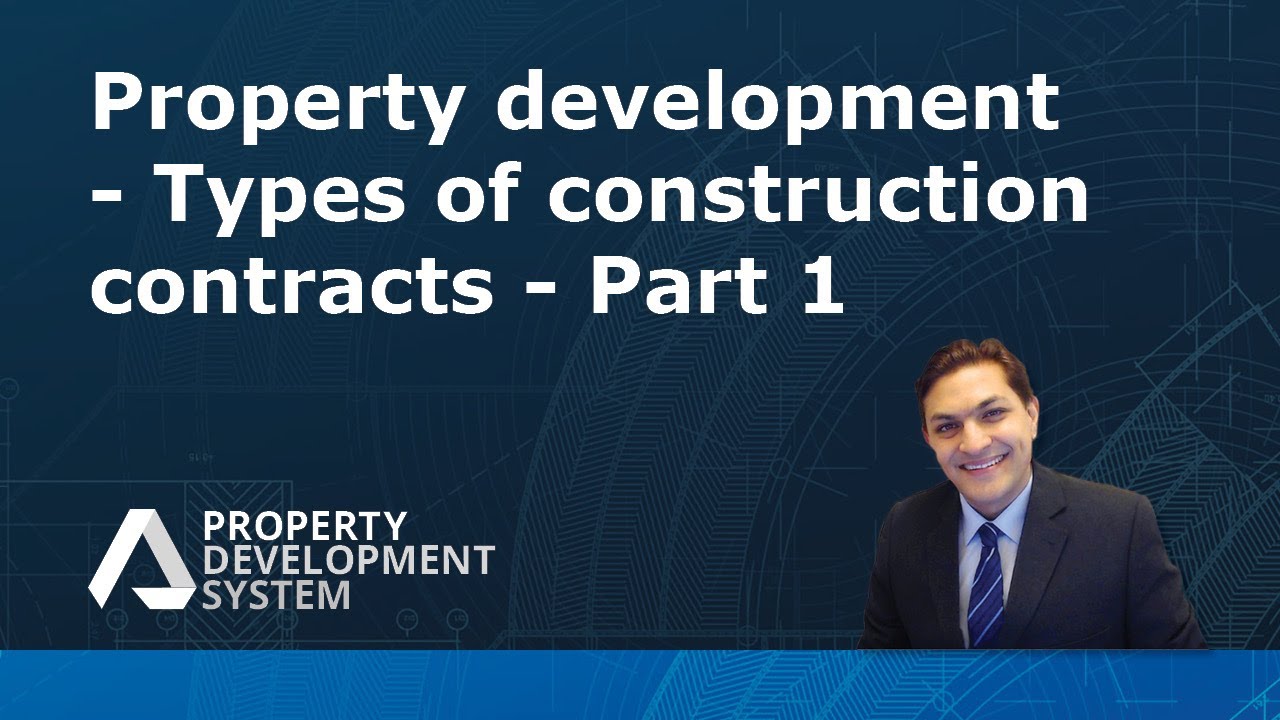Types of Contracts - Part 1
Here is an insightful overview of different types of construction contracts. It focuses on the characteristics and implications of Fixed Price, Cost Plus, Design and Construct, and Construction Management contracts, highlighting their relevance in the construction and development industry.
Types of Contracts
Four main types: Fixed Price, Cost Plus, Design and Construct, and Construction Management.
Fixed Price
Preferred by banks to avoid hidden costs, requires a detailed scope of works.
Cost Plus
No upper limit on costs; the builder charges a margin on top of the direct costs.
Variations
Changes to the scope of works, like adding a wall or another room.
Prime Costs
Concerns changes to prime cost and provisional sum items, affecting the project’s budget.
Frequently Asked Questions
What are the main advantages and disadvantages of a Fixed Price contract?
Fixed Price contracts are highly favored in the construction industry, especially by banks, due to their transparency and the absence of hidden costs. The main advantage of such contracts is their predictability in terms of budgeting, as they require a comprehensive scope of works that details all aspects of the project beforehand.
This clarity and predefined cost framework make Fixed Price contracts attractive for both residential and commercial projects. However, the video suggests a potential downside could be the inflexibility regarding changes or variations to the project, which might lead to additional costs outside the original contract terms.
How do variations impact the overall cost of a construction project?
Variations in a construction project, refer to any changes to the original scope of works, such as adding an extra wall, creating a new room, extending an area, or installing additional power points. These alterations, although they might seem minor, can significantly affect the overall cost of the project.
For fixed Price contracts, these variations necessitate renegotiation and can lead to increased costs, as they deviate from the initially agreed upon scope and budget. The process of managing these variations requires clear communication and agreement on the new terms, ensuring both parties understand the financial and temporal implications of the changes.
In what scenarios are Cost Plus contracts preferred over Fixed Price contracts?
Cost Plus contracts are preferred in scenarios where the project’s scope is not clearly defined from the start or is expected to change significantly during the construction phase. These contracts are beneficial when there is a need for flexibility in project specifications, materials, and the work required.
Unlike Fixed Price contracts, Cost Plus contracts allow for adjustments in the project’s scope without renegotiating the entire contract. The builder charges for the actual costs incurred, plus a margin or fee, which can be a fixed percentage or a fixed fee.
This arrangement is particularly advantageous for projects where it’s challenging to estimate all costs upfront, offering a way to manage unexpected expenses while ensuring the builder is adequately compensated for their services.
What are the main types of construction contracts?
There are four main types of construction contracts:
- Fixed Price
- Cost Plus
- Design and Construct
- Construction Management
These contracts are utilized in the construction and development industry, each catering to different project requirements and risk management approaches.
What is a Fixed Price Contract?
A Fixed Price Contract is a type of construction agreement where the cost is agreed upon before the project starts.
This contract type is characterized by a detailed scope of work that outlines exactly what construction will involve, without leaving room for hidden costs. It is preferred by banks and financial institutions because it provides a clear, upfront cost, reducing the risk of unexpected expenses.
Why do banks prefer Fixed Price Contracts?
Banks and financial institutions prefer Fixed Price Contracts because they eliminate the risk of hidden or unforeseen costs. Since the contract outlines a detailed scope of works and the total price is agreed upon beforehand, it offers a sense of financial security and predictability. This helps in planning and managing construction budgets more effectively.
What is a Cost Plus Contract?
A Cost Plus Contract is a construction contract where the client agrees to pay the contractor all direct costs incurred during the project plus an additional percentage or fixed fee as profit. Unlike Fixed Price Contracts, Cost Plus Contracts do not have an upper limit on costs, allowing for more flexibility in the scope of work. However, this flexibility can lead to higher overall project costs since the contractor is reimbursed for all expenses plus a margin.
How do variations affect construction contracts?
Variations refer to any changes made to the initial scope of works agreed upon in the contract. This could include adding new elements to the project, like a wall or another room. Variations can significantly affect the project’s budget and timeline, especially in Cost Plus Contracts where changes directly impact the total cost.
In Fixed Price Contracts, variations usually require negotiation and approval from both parties to proceed, as they alter the originally agreed-upon price and scope.
What are Prime Costs in construction contracts?
Prime Costs pertain to specific items in a construction project whose details or brands are not known at the time of entering the contract and thus are allocated a provisional sum. These items can include fixtures, fittings, or materials that are crucial to the project.
As these costs can vary depending on the final selection, they have the potential to affect the project’s overall budget. Managing prime costs requires careful selection and negotiation to ensure that the project remains within the financial boundaries set by the contract.
How does a Design and Construct Contract work?
A Design and Construct Contract combines the design and construction responsibilities under a single contract. This means the contractor is not only responsible for building the project but also for its architectural and engineering design.
This type of contract is beneficial for project owners who prefer a single point of accountability for both the design and construction phases, potentially streamlining the project timeline and improving efficiency.
What is Construction Management?
Construction Management is a contract or arrangement where the construction manager acts on behalf of the client to manage the construction process from start to finish. This includes overseeing contractors, managing schedules, and controlling costs.
This type of arrangement allows for greater flexibility and adaptability in managing the project, as the construction manager coordinates all aspects of the construction process, ensuring that the project meets the client’s specifications, budget, and timeline.
Test Your Knowledge
Multiple Choice Questions on Construction Contracts
1. Which of the following contracts is most preferred by banks due to its ability to avoid hidden costs?
A. Cost Plus Contract
B. Design and Construct Contract
C. Construction Management Contract
D. Fixed Price Contract
2. In which type of contract does the builder charge a margin on top of the direct costs, without an upper limit on the overall project cost?
A. Fixed Price Contract
B. Cost Plus Contract
C. Design and Construct Contract
D. Construction Management Contract
3. What are variations in the context of construction contracts?
A. Adjustments to the project’s timeline only
B. Changes to the original contract terms and conditions
C. Changes to the scope of works, such as adding a wall or another room
D. Variations are specific to Cost Plus Contracts and involve direct costs only
4. Prime Costs in construction contracts are related to:
A. The highest costs incurred during the construction process
B. Changes to prime cost and provisional sum items that affect the project’s budget
C. The contractor’s profit margin
D. Fixed fees associated with Construction Management Contracts
5. Which contract combines the responsibilities of design and construction under one agreement?
A. Fixed Price Contract
B. Cost Plus Contract
C. Design and Construct Contract
D. Construction Management Contract
6. The role of a construction manager in a Construction Management Contract is to:
A. Oversee the project’s finances only
B. Act solely as the project’s architect
C. Manage the construction process on behalf of the client, including overseeing contractors and controlling costs
D. Provide legal advice to the client regarding the construction process
Answers:
- D. Fixed Price Contract
- B. Cost Plus Contract
- C. Changes to the scope of works, such as adding a wall or another room
- B. Changes to prime cost and provisional sum items that affect the project’s budget
- C. Design and Construct Contract
- C. Manage the construction process on behalf of the client, including overseeing contractors and controlling costs
Assignment
Understanding Construction Contracts: Practical Assignment
Objective:
The goal of this assignment is to deepen your understanding of the different types of construction contracts, their characteristics, and implications. Through a series of tasks, you will analyze real-world scenarios, conduct research, and apply your knowledge to determine the most suitable contract types for various situations.
Assignment Tasks:
Task 1: Case Studies Analysis
- A. Imagine you are working with a bank that prefers to fund projects with a clear budget to avoid hidden costs. Analyze a hypothetical construction project where the scope includes building a residential complex. Prepare a brief report on why a Fixed Price Contract would be beneficial for this project, considering the bank’s preference.
- B. Consider a situation where a project owner wants flexibility in choosing high-quality materials and design changes during the construction of a luxury home. Discuss the advantages and disadvantages of using a Cost Plus Contract for this project, including the potential impact on budget and timelines.
Task 2: Role-Playing Exercise
- Form groups of 4 students. Each group will simulate a project meeting between a project owner, a contractor, a bank representative, and a construction manager.
- Scenario: The project is to construct a new library in the community. Decide among your group which type of contract (Fixed Price, Cost Plus, Design and Construct, or Construction Management) would best suit this project. Each member must advocate for the contract type they think is most appropriate, considering factors like budget, timeline, design flexibility, and financial oversight.
- Prepare a presentation of your group’s decision, including the reasons for choosing a particular contract type and how you plan to manage risks associated with the project.
Task 3: Research Question
- A. Investigate a real-world construction project that used a Design and Construct Contract. What were the reasons for choosing this contract type? Discuss how the project was executed, including any challenges faced and how they were addressed.
- B. Explore the role of a construction manager in a Construction Management Contract. Find a case study of a construction project managed under this contract type and analyze the construction manager’s contributions to the project’s success.
To Do:
- For Task 1: Draft the reports for scenarios A and B, focusing on the contract types’ characteristics relevant to each scenario.
- For Task 2: Each group member should prepare their argument in favor of a contract type, considering their assigned role’s perspective. Then, collaborate to create a cohesive presentation.
- For Task 3: Conduct research to find suitable examples for both parts A and B. Summarize your findings, highlighting the critical aspects of each contract type’s application in real-world projects.
Submission Requirements:
- Submit the reports from Task 1 individually.
- For Task 2, submit your group’s presentation slides and a summary of the discussion and decision-making process.
- For Task 3, each student will submit their research findings and analysis.



